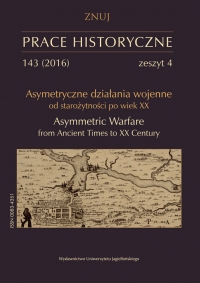Poczucie tożsamości mieszkańców małego miasta galicyjskiego (w drugiej połowie XIX wieku)
A sense of identity of the inhabitants of the Galician town (in the second half of the 19th century)
Author(s): Jadwiga HoffSubject(s): Jewish studies, Local History / Microhistory, Social history, 19th Century, Inter-Ethnic Relations, Politics and Identity, Identity of Collectives
Published by: Wydawnictwo Uniwersytetu Jagiellońskiego
Keywords: Galicia; small towns; small town community; social and professional structure; Ruthenians-Ukrainians; Poles; Jews; identity;
Summary/Abstract: Small Galician towns had a very varied social structure. Their inhabitants formed a strictly hierarchical community. People socialized exclusively with the members of their own particular social group. One thing that united all, both those from “high society” and those standing at lower levels of the social ladder, was an unfavorable attitude towards the people living in the country, arising from townspeople’s conviction of their own “superiority.” Besides, those from the country did not consider themselves equal to townsfolk, whom they regarded as “gentlepeople.” A significant proportion of the small town community were Jews (in Western Galicia from slightly above 37% in 1880 to 33% in 1910; in the towns of Eastern Galicia from 44.6% to 43.6% respectively). The second largest religious-ethnic group among Eastern Galician small town residents were Ruthenians-Ukrainians (about 30%). The smallest community were the Roman Catholics, identified with Poles (from 23% in 1880 to more than 26% in 1910). In all small towns the Christians and the Jews formed separate communities, whose interactions were mostly business-related. In the small towns of Eastern Galicia, where one third of the population comprised of Ruthenians, both they and the Poles, but also the Jews, had a strong sense of localness, which effectively reduced ethnic tensions. The spread of national ideas in the last years of the 19th century changed this situation; it substantially weakened the previous bonds between people within neighboring local communities. Already at the turn of the 19th and 20th century the inhabitants of small Eastern Galician towns ceased to be the locals; they became either Poles or Ukrainians.
Journal: Prace Historyczne
- Issue Year: 144/2017
- Issue No: 2
- Page Range: 371-383
- Page Count: 13
- Language: Polish

